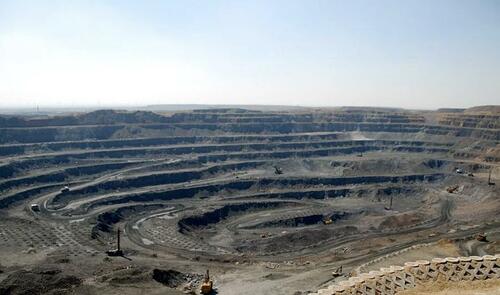
Rare earth mineral companies in China have been stung by declining prices at the same time the government "tightens its grip" on the industry, according to Nikkei Asia.
Companies like Rising Nonferrous Metals, a rare-earth miner listed in Shanghai, are losing money this year, a stark contrast to last year's profitability.
The company is blaming "drastic slide in sales prices of its major rare-earth products," according to the report. They sell dysprosium, terbium and didymium, a mix of neodymium and praseodymium.
This company belongs to central government-owned platform China Rare Earth Group, which was established in December 2021 when three state owned miners merged. It was then designated a "central company", designating it as controlled by the State Council.
Nikkei reports that another arm of the central company, China Rare Earth Resources and Technology, is also expecting a net loss for 1H 2024. Fuijan province controlled Xiamen Tungsten also said revenue had dropped 22% on the year.
China holds the world's largest reserves of 17 rare-earth elements, vital for tech products like smartphones, electric vehicles, wind turbines, and missile defense systems.
Amid rising U.S. tensions, China is increasingly leveraging these resources. Last month, the central government mandated state control over rare-earth resources to ensure national resource security and industrial security.
This new directive aligns with President Xi Jinping's focus on a "holistic approach to national security."
Despite increased sales, suppliers are struggling. Shenghe Resources Holding, supported by the Finance Ministry, forecasts a significant interim net loss, citing a "substantial decline" in rare-earth prices. Shenghe is expanding through acquisitions, notably purchasing Strandline Resources UK for 43 million Australian dollars to gain control over Tanzanian mineral projects.
China Northern Rare Earth (Group) High-Tech, the top rare-earth miner by volume, barely turned a profit in the first half of the year, with a sharp profit decline of 95% to 97%. The company's board attributes this to falling prices due to higher production, increased imports, and more recycling, while demand growth has lagged.
Rare earth mineral companies in China have been stung by declining prices at the same time the government “tightens its grip” on the industry, according to Nikkei Asia.
Companies like Rising Nonferrous Metals, a rare-earth miner listed in Shanghai, are losing money this year, a stark contrast to last year’s profitability.
The company is blaming “drastic slide in sales prices of its major rare-earth products,” according to the report. They sell dysprosium, terbium and didymium, a mix of neodymium and praseodymium.
This company belongs to central government-owned platform China Rare Earth Group, which was established in December 2021 when three state owned miners merged. It was then designated a “central company”, designating it as controlled by the State Council.
Nikkei reports that another arm of the central company, China Rare Earth Resources and Technology, is also expecting a net loss for 1H 2024. Fuijan province controlled Xiamen Tungsten also said revenue had dropped 22% on the year.
China holds the world’s largest reserves of 17 rare-earth elements, vital for tech products like smartphones, electric vehicles, wind turbines, and missile defense systems.
Amid rising U.S. tensions, China is increasingly leveraging these resources. Last month, the central government mandated state control over rare-earth resources to ensure national resource security and industrial security.
This new directive aligns with President Xi Jinping’s focus on a “holistic approach to national security.”
Despite increased sales, suppliers are struggling. Shenghe Resources Holding, supported by the Finance Ministry, forecasts a significant interim net loss, citing a “substantial decline” in rare-earth prices. Shenghe is expanding through acquisitions, notably purchasing Strandline Resources UK for 43 million Australian dollars to gain control over Tanzanian mineral projects.
China Northern Rare Earth (Group) High-Tech, the top rare-earth miner by volume, barely turned a profit in the first half of the year, with a sharp profit decline of 95% to 97%. The company’s board attributes this to falling prices due to higher production, increased imports, and more recycling, while demand growth has lagged.
Loading…




